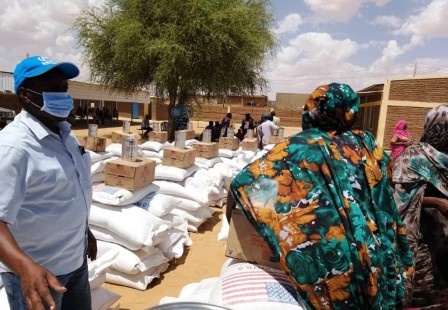U.S concerned over famine in parts of Sudan’s North Darfur
August 1, 2024 (PORT SUDAN) – The U.S. Ambassador to the United Nations, Linda Thomas-Greenfield has expressed deep concern over the official declaration of famine in Sudan’s Zamzam Internally Displaced Persons (IDP) camp, urging the warring factions to allow the free flow of humanitarian aid.
An assessment by the Famine Review Committee (FRC) of the Integrated Food Security Phase Classification (IPC) concluded that famine conditions are prevalent in parts of North Darfur, including the Zamzam camp in El Fasher.
As such, displacement and humanitarian access constraints due to war in Sudan has resulted in famine in a camp for hundreds of thousands of displaced people in North Darfur.
The Zamzam Internally Displaced Persons (IDP) camp, south of El Fasher town is one of the largest IDP camps with an estimated population of at least 500,000. The situation has been worsened by the escalating violence in Sudan, which has been persisting for over 15 months now, severely impeding humanitarian access.
“This official declaration by the Famine Review Committee confirms what we already knew: people are dying, and have been dying, in Sudan from starvation,” Thomas-Greenfield, said in a statement.
She called on the Sudanese Armed Forces (SAF) and the Rapid Support Forces (RSF) to “remove barriers to aid, and allow desperately needed food, water, and medicine to flow freely across borders and conflict lines.”
Thomas-Greenfield also urged the leaders of both factions to attend the ceasefire talks in Switzerland scheduled for August 14.
Areas are reportedly classified in IPC Phase 5 (famine) when at least one in five people or households have extreme lack of food and face starvation and destitution, resulting in extremely critical levels of acute malnutrition and death.
The escalation of violence in El Fasher, characterized by widespread clashes has forced many residents to seek refuge in IDP camps lacking basic services.
Around 320,000 people are believed to have been displaced since mid-April in El Fasher. Also at least 150,000 to 200,000 of them are believed to have moved to Zamzam camp in search of security, basic services, and food since mid-May.
The camp population has expanded to over half a million in a few weeks.
There are concerns that restrictions on humanitarian access, including intentional impediments imposed by the active parties to the conflict, have severely restricted the capability of aid agencies to effectively scale up their response efforts.
These obstructions have critically hindered the delivery of necessary aid and exacerbated the food crisis, driving some households into famine conditions.
In addition, basic human needs for health services, water, food, nutrition, shelter, and protection are not being met due to a multi-sectoral collapse in the country.
Meanwhile, the World Food Programme (WFP) urgently called on all warring parties to allow humanitarian organizations guarantees of safe passage for those delivering life-saving aid to communities in the most desperate circumstances.
“It is not too late to stop famine from spreading to other parts of the country,” said WFP Executive Director Cindy McCain, adding “To save lives and prevent widespread starvation in Sudan, we must be able to reach all areas where people are in need.”
She added: “The Sudanese people are counting on us as their lifeline after enduring unimaginable hardship since this conflict began.”
Since conflict broke out in Sudan in mid-April 2023, WFP has been warning of a spiralling hunger crisis while calling on the warring parties to allow humanitarian access.
(ST)

